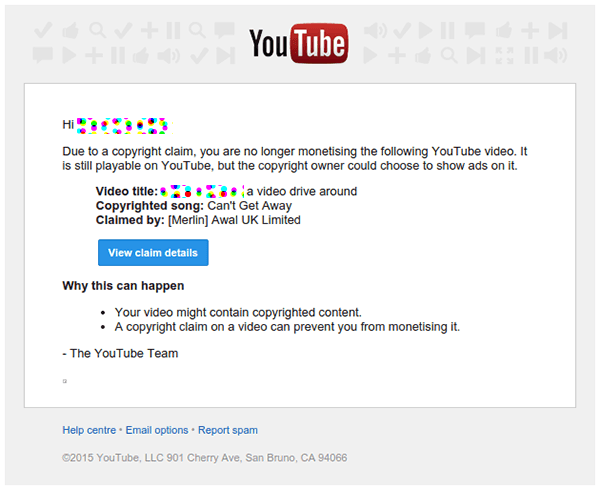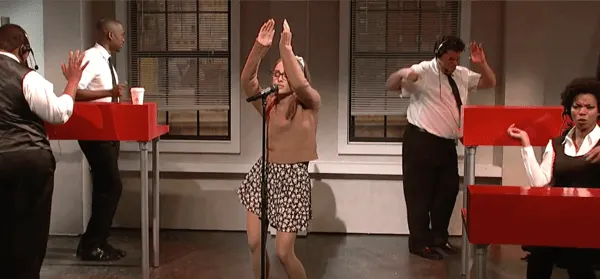The nerve of these people to try to convince us that THEY are the victims here… God forbid musicians find a way to reach their own fans.
The State of Youtube’s Claim System
As everyone knows, Youtube’s claim system is severely broken when it comes to music. Not a day goes by when a creator on the video streaming site isn’t essentially unfairly robbed of their hard earned money for things as harmless as a car driving by that was blasting music in the background for 5 seconds.
The real controversy here is that it’s not like Youtube simply cuts off the advertisements for that video if some major music label is using automated means to find the sonic signature of their music in these videos. They keep running ads on YOUR videos, you as the creator, and then give that revenue to the major labels that were allowed to make the claim.
And if this happens enough times (three strikes and you’re out), you can lose your ability to monetize any of your videos, past and present. Sure, you can appeal, which is a manually reviewed process, while the claims are automated and go into effect immediately.

You can see how problematic this is and imagine how big the backlog of appeals is too.
The New Claim Rule
Youtube understands this is a problem (now that there’s been a ton of backlash…) and is seeking to pacify creators.
On August the 15th, 2019, Youtube adjusted their policy on allowing copyright owners from manually making claims on videos their automated means wouldn’t otherwise catch. Imagine that while considering the fact that these automated bots can already catch clips as short as half of a second.
The problem is two fold. First, major labels are paying companies to manually claim videos in bulk once their bots find music clips. They don’t have to provide much info other than that their client holds the copyright.
Second, they’re ignoring the legal definition of Fair Use in the United States (and I assume other countries), which allows for extremely short instances of copyrighted materials to be used. Youtube even has a page about Fair Use that clarifies this, yet allows these claims to occur by the boatload.
The new claim rule does have one great aspect: it forces claimants to provide the timestamps where their copyrighted material appears, and you as the creator have the option to mute that portion of the video and immediately appeal the claim. That’s honestly good.
In typical fashion, this new rule is vague, allowing tons of flexibility and leeway. And that goes both ways, where the claimant and the creator might benefit. But who has the money and the means to stretch that small gap into a chasm?
Major Labels Sending Out Press Releases
Many people aren’t aware that nearly everything is a proxy war fought on a battleground of the mind, using psychological warfare. And of course that includes corporations.
Today, LedgerNote received an unsolicited press release from a marketing company representing a Youtube claim automation company representing a many major labels. We’re already three steps away from the real culprits, but that’s just the beginning.
First off, we never signed up for these press releases. They are completely unsolicited. They also are breaking the law set forth by the Federal Trade Commission, called the CAN-SPAM Act in two ways.
You can’t send unsolicited commercial emails and you must provide a method to opt-out of receiving the emails (a one-click unsubscribe link). These emails do neither. You could say these are “relational” emails, but then they’re still breaking the law regardless.
You know without a doubt that LedgerNote is not the only music blog to receive this press release. To confirm, we ran a time-based search in the past 24 hours to see if anyone actually took the bait and spread this fake news. They did. Here’s one example.
False Victimization
In order to protect ourselves from any corporate sabotage, we’re not going to out the ladder of companies involved in this, though you should be able to easily figure it out (wink wink).
This press release mentions the “drastic effects” this can have on “the ability of rights holders and Youtube creators” (notice how they try to group the predator in with the prey) “to monetize videos that involve music” (notice the misdirection that this is about their own music videos).
They then get honest and say that rights holders “will no longer be allowed to monetize videos that use short music snippets.” Are they trying to tell me that they can’t monetize their own videos or that they post videos with short snippets for their own music? No, they’re clearly and covertly talking about monetizing YOUR videos, not theirs.
The problem for them, they continue, is that Youtube doesn’t explicitly state what “short” means (meaning they’re salty that they can’t claim your video for as low as 500 milliseconds of use). They opine that “short snippets account for a significant amount of music usage in Youtube videos.”
Why They’re Mad: The Money
The company, in this case, that has automated this process, admits again that they find clips as short as half of a second and reveal this shocking piece of information:
“Snippet usage of music is on average roughly 9% of an artists’ Youtube views, and hence 9% of the revenue they can claim on Youtube.”
They then illustrate this for us with a concrete example:
“Ariana Grande has 6 hit songs at the moment. That 9% represents over 600 million views that she can no longer claim. [We] estimate that represents almost $700k in revenue to date. Just for Ariana Grande. Just on 6 songs.”
Assume half of those views are legitimate claims from re-uploaders and the other half are from honest creators with song clips as low as half of a second accidentally appearing in their videos. That’s $350k in revenue, just for Ariana Grande, with just 6 songs, taken from honest, hard working creators.
Now think about $700k. It’s a literal drop in the bucket. These artists go on tour and make double and triple that per night of a 100 day tour. How much do you think poor Ariana made throughout her Disney career? How much do you think she made on this one appearance on Saturday Night Live?
Then tell me how much money the average Youtube creator makes while having to walk on eggshells about what sounds are in the background or which logo they accidentally showed.

Yes, big labels absolutely should be allowed to claim unfair usages. But they’re also maliciously destroying real people’s careers and sources of income.
Call It What You Want: Major Labels Always Win
You may see this debacle from the other side of the argument. That’s perfectly valid and fine. Neither side is arguing that copyright holders shouldn’t be able to enforce their copyrights. But certainly you’re telling me half of a second of audio in a 30 minute video means they get to take all of the revenue earned from that video and that that’s fair.
It’s also a very one-sided fight, one backed by money, mass labor, advanced technology, and Youtube itself, against the lonely creator in his home grinding out videos daily in order to pay rent.
The most eye-opening part of this is that we now have real numbers to talk about. Numbers like:
- 500 milliseconds (half of a second)
- $700,000 in claimed revenue…
- From 1 single artist…
- On only 6 songs…
- In what we estimate to be just the last month.
The worst part is that the major labels, through a triple-tiered subversive plan of attack, are sending illegal and unsolicited emails to small music blogs in order to spread a narrative that they, in fact, are the victims in this fight.
We all supported you, the major labels and artists, all the way up to the point where you crossed the line from getting what is rightfully yours to being legitimate C’s and T’s (I don’t want to actually call them these words, for legal reasons, but they rhyme with “brooks” and “leaves”).
I just keep thinking about how “short clips a half of a second in length” and how much money that adds up to in such a short period of time for so few songs.
This is just the tip of the iceberg when you look at some other predatory lawsuits we’ve covered, such as the Ghostbusters Theme debacle, John Fogerty being sued for sounding like himself, and even the Parental Advisory Sticker abuse.